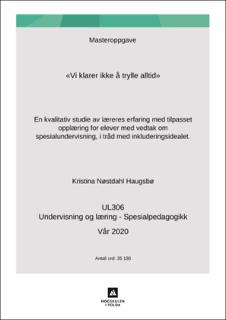"Vi klarer ikke å trylle alltid". En kvalitativ studie av læreres erfaring med tilpasset opplæring for elever med vedtak om spesialundervisning, i tråd med inkluderingsidealet
Master thesis
Permanent lenke
https://hdl.handle.net/11250/2663869Utgivelsesdato
2020Metadata
Vis full innførselSamlinger
Sammendrag
Denne oppgaven tar for seg læreres erfaringer med tilpasset opplæring for elever med vedtak om spesialundervisning. Inkludering har blitt et sentralt begrep og et viktig prinsipp for opplæring, både nasjonalt og internasjonalt. Ved signeringen av Salamancaerklæringen (UNESCO, 1994), forpliktet Norge seg til å jobbe mot «schools for all, institutions which include everybody, celebrate differences, support learning and respond to individual needs»(UNESCO 1994, forord).
Tilpasset opplæring blir et viktig verktøy for å realisere målet om en inkluderende skole. Under begrepet tilpasset opplæring finnes også prinsippet om spesialundervisning. De alle fleste elevene som har rett på spesialundervisning mottar denne hjelpen kun deler av tiden i skolen (Festøy & Haug, 2017, s. 52), noe som fører til at elevene tar del i den ordinære undervisningen resten av tiden. Dette betyr at spesialundervisningen bare er et tilskudd til den ordinære opplæringen.
Utsagnene leder til et viktig spørsmål, som retter seg mot hvordan lærere legger til rette for at disse elevene skal få et tilfredsstillende utbytte også i den ordinære undervisningen. Med utgangspunkt i dette ble studiens problemstilling som følgende:Hvordan tilpasser lærere den ordinære undervisningen for elever med vedtak om spesialundervisning, i tråd med inkluderingsidealet?
I datainnsamlingen benyttet jeg meg av kvalitativ forskningsmetode, hvor intervjuer av tre ulike kontaktlærere til slutt dannet datagrunnlaget. Ved studier som denne, hvor en studerer læreres arbeid gjennom intervju ved få enheter, vil en ikke kunne trekke generelle konklusjoner. Kunnskapen kan likevel gi et godt innblikk i arbeidet med tilrettelegging oginkludering, og være nyttig for andre i samme situasjon.
Med bakgrunn i funnene gjort i denne studien, og ut fra datamaterialets omfang kan det se ut til at opplæringstilbudet til elevene med enkeltvedtak forsøkes etter beste evne å organiseres i tråd med prinsippene om inkludering og tilpasset opplæring. Jeg velger å bruke uttrykket «etter beste evne» fordi det kan se ut til at tilpassingen av den ordinære undervisningen henger sammen med hvordan spesialundervisningen organiseres, samt lærernes individuelle kompetanse og erfaring i skolen. Summary
This study addresses teachers' experiences with adapted education in meet with students with special educational needs (SEN). Inclusion has become a central concept and an important principle for education, both nationally and internationally. In the signing of the Salamanca Declaration (UNESCO, 1994), Norway obliged to work towards «schools for all,institutions that include everybody, celebrate differences, support learning and respond toindividual needs» (UNESCO 1994, preface). Adapted education becomes an important tool in realizing the goal of inclusive education. Under the concept of adapted education, we alsofind the principle of special education. The majority of pupils who are entitled to specialeducation receive this assistance only part of the time in school (Festøy & Haug, 2017, p. 52).
For the remaining time, these pupils participate in ordinary teaching. This means that special education is only an addition to the ordinary teaching. This statement leads to an important question on how teachers adapt their teaching to ensure that these pupils have a satisfied benefit from their time spent in ordinary teaching. Based on this, the study's research question is as following:How do teachers adapt their teaching for students with special educational needs, inline with the ideal of inclusive education?
This is a qualitative study where I have conducted interviews with three different teachers. In limited studies like this, where the data is based on three teachers’ experiences and reflections alone, it is not possible to draw general conclusions. However, the knowledge can be useful to other teachers in the reflections of their own practices of adapted and inclusive education for SEN students.
Based on my findings, it may appear that the teaching of the students with SEN is organized in line with the principles of inclusion and adapted education to the best of the teacher’s ability. I choose to use the term «to the best of the teacher’s ability» because it may seem that the degree of adaptation is related to how the special education is organized, as well as the teachers' individual competence, and experience in school
